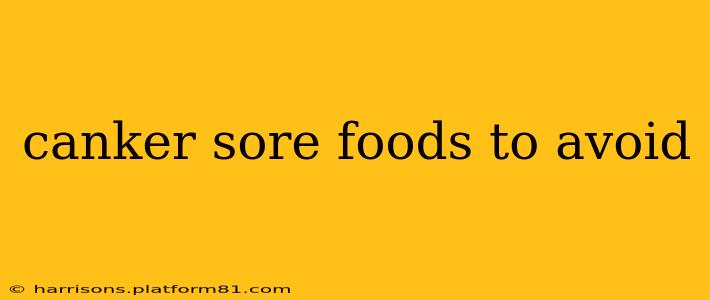Canker sores, those painful little ulcers that appear inside your mouth, can be a real nuisance. While their exact cause isn't fully understood, certain foods can exacerbate their formation and prolong healing. Understanding which foods to avoid is crucial for managing canker sore outbreaks and promoting faster recovery. This guide will help you navigate the culinary landscape and identify potential irritants.
What are Canker Sores?
Before diving into the foods to avoid, let's briefly define canker sores (also known as aphthous ulcers). These are small, shallow lesions that develop on the soft tissues of your mouth, including the tongue, cheeks, and gums. They're usually round or oval, and while generally harmless, they can be quite painful and interfere with eating and speaking.
Foods That Commonly Trigger Canker Sores
Several foods are known to trigger or worsen canker sores. These irritants often share characteristics like acidity, spiciness, or harsh textures. Let's explore some of the most common culprits:
Highly Acidic Foods:
- Citrus fruits: Oranges, lemons, limes, grapefruits, and their juices can be particularly irritating to already-inflamed tissues. The high acidity can further damage the delicate membranes of the mouth.
- Tomatoes: While technically a fruit, tomatoes possess a considerable amount of acidity. Tomato-based sauces and ketchup can also be problematic.
- Vinegar: The acetic acid in vinegar, found in salad dressings, marinades, and pickles, can be a major irritant.
Spicy Foods:
- Chili peppers: Capsaicin, the compound responsible for the heat in chili peppers, can cause significant burning and irritation in the mouth, worsening existing canker sores.
- Spicy curries: Similarly, many curries contain a blend of spices that can be irritating.
- Hot sauces: Adding hot sauce to already irritating foods only compounds the problem.
Hard and Crunchy Foods:
- Chips: The sharp edges of chips can physically damage the delicate tissues of a canker sore, leading to increased pain and prolonged healing.
- Crackers: Similar to chips, hard crackers can cause irritation and further trauma.
- Nuts: While nutritious, hard nuts can scrape against canker sores, slowing down healing.
What About Other Foods? Are There Specific Ingredients to Watch Out For?
What are some common food additives that can exacerbate canker sores?
Certain food additives, like artificial sweeteners, coloring agents, and preservatives, have been linked to canker sore outbreaks in some individuals. While the evidence isn't conclusive for all additives, it's worth noting that eliminating processed foods and opting for whole, unprocessed options can sometimes help.
Are there any particular types of nuts or seeds to avoid?
While all nuts and seeds pose a risk due to their potential to scratch the sores, harder varieties like almonds and cashews are more likely to cause problems than softer ones. Always opt for well-chewed nuts and seeds.
Can certain food sensitivities trigger canker sores?
Food sensitivities, particularly to gluten and dairy, are sometimes linked to increased canker sore frequency. If you suspect a food sensitivity might be playing a role, consult with a doctor or allergist for testing and guidance.
Tips for Managing Canker Sores
Beyond avoiding trigger foods, here are some helpful tips for managing canker sores:
- Rinse your mouth with salt water: This simple remedy can help reduce inflammation and pain.
- Use over-the-counter pain relievers: Topical anesthetics or pain-relieving gels can provide temporary relief.
- Avoid smoking and alcohol: These can further irritate the sores.
- Maintain good oral hygiene: Brush and floss regularly to keep your mouth clean.
Remember, the information provided here is for general knowledge and does not constitute medical advice. If you have frequent or severe canker sores, consult a doctor or dentist for proper diagnosis and treatment. They can help identify underlying causes and recommend appropriate management strategies.
